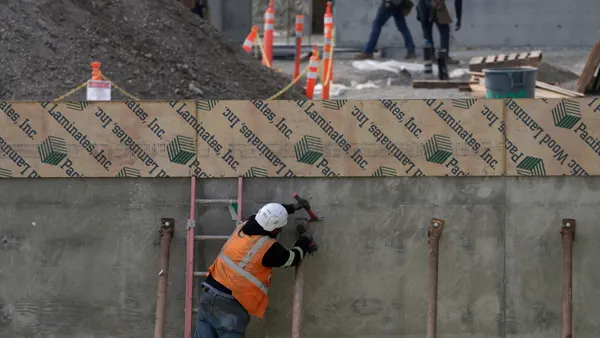Dive Brief:
- A new report from the Midwest Policy Economic Institute and Colorado State University Pueblo says that Wisconsin's 2017 repeal of its prevailing wage laws has failed to produce the promised cost savings for public transportation projects, and has led to lower construction worker pay, diminished apprenticeship programs and a reduction in bid competition.
- The two groups analyzed inflation-adjusted, per-mile highway construction data and found that project costs increased by $52,000 per mile after the repeal. The study also revealed that worker pay shrunk by $2,600 per year, a 6% drop. In contrast, private construction CEOs' pay rose 54% to about $93,900 per year, while cost overruns increased and skilled worker turnover in the sector rose 8%.
- The report also said the number of state Department of Transportation construction projects awarded to out-of-state contractors increased by 60% and that bid competition was down 16%.
Dive Insight:
The results of the study are not surprising, said John Mielke, president of the Associated Builders and Contractors (ABC) of Wisconsin, adding the Institute has a long history of favoring union policies when looking at the other reports they've produced.
He said that the authors of the new analysis cherry-picked data to support a predetermined set of conclusions.
"It's more of a document to support a political position than it is academic research, at least in my opinion," Mielke said, noting that it doesn't support what the ABC has seen happening on the ground in Wisconsin since the repeal, he said.
Prior to the COVID-19 pandemic, Mielke said, the state had about 3% unemployment and "significant" competition for skilled workers. In fact, he added, if one looks at the "no thumb on the scale" statistics from the Bureau of Labor Statistics, wages have increased for construction workers in Wisconsin from 2016 to 2019.
And, according to Mielke, apprenticeship enrollments are at a 10-year high and are a draw even with the recent economic uncertainty.
As far as wages, the ABC official said, new trade union collective bargaining agreements in the state have not resulted in wage decreases. "That sector of the workforce is demonstrably getting wage increases," he said. "If nonunion contractors aren't keeping pace with market and economic conditions, [skilled workers] will go elsewhere."
Mielke said unions heavily recruit the state's construction workers, so "if our guys want to hang onto the best people, they have to pay them well and provide benefits.
"The gloom and doom [in the report] just don't bear out in actual experience," he said.










